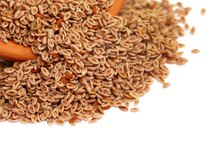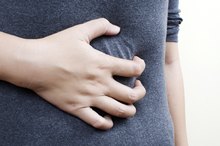What does fact checked mean?
At Healthfully, we strive to deliver objective content that is accurate and up-to-date. Our team periodically reviews articles in order to ensure content quality. The sources cited below consist of evidence from peer-reviewed journals, prominent medical organizations, academic associations, and government data.
- Mayo Clinic.com: Diverticulitis
- National Institute of Diabetes and Digestive and Kidney Disorders: Diverticulitis
The information contained on this site is for informational purposes only, and should not be used as a substitute for the advice of a professional health care provider. Please check with the appropriate physician regarding health questions and concerns. Although we strive to deliver accurate and up-to-date information, no guarantee to that effect is made.
Psyllium Husks and Diverticulitis
Many people develop small pouches in the large intestines known as diverticula. These small pouches occur when portions of the colon bulge through weak points in the intestinal wall. If these pouches become inflamed, it results in a condition known as diverticulitis 1. Diverticulitis can be treated or prevented with dietary changes, including the use of psyllium husks 1.
Diverticulitis Symptoms
Diverticulitis results from irritation and inflammation of the diverticula in the large intestine 1. One of the most common symptoms, the National Institute of Diabetes and Digestive and Kidney Disorders explains, is abdominal pain, which can occur suddenly or develop over a period of time. Diverticulitis may also cause:
- nausea
- vomiting
- fever
- chills
- cramping
- a change in bowel habits 1
It may also result in internal bleeding or the development of an intestinal obstruction, which can prevent feces from being excreted.
Diverticulitis and FIber
Glucomannan Vs. Psyllium
Learn More
Diverticulitis is more common in areas where people follow a low-fiber diet, the Mayo Clinic states 1. If you have a low fiber diet, your feces can become unusually dry and hard, resulting in constipation. When you are constipated, you have to use more force to have a bowel movement, which can result in diverticula formation. If you want to prevent diverticulitis, you should increase the amount of fiber in your diet 1. A high fiber diet can also be used to treat diverticulitis 1.
Psyllium
Psyllium is a commonly used form of soluble fiber. Psyllium comes from the plant Plantago ovata -- an herb that resembles a shrub and can be found primarily in India, though it grows throughout the world. The Plantago ovata produces thousands of small gel-coated seeds that are harvested as psyllium husk. Psyllium husk swells when it comes into contact with water and it forms a gel, making it suitable as a form of soluble fiber.
- Psyllium is a commonly used form of soluble fiber.
- Psyllium husk swells when it comes into contact with water and it forms a gel, making it suitable as a form of soluble fiber.
Psyllium and Diverticulitis
Fiber Foods and Messy Stool
Learn More
If you have diverticulitis, your doctor may recommend that you take between 3 and 5 g of psyllium husk each day, the University of Maryland Medical Center reports 123. You should always take psyllium supplements with water and make sure that you get enough fluid intake throughout the day because otherwise the psyllium can become lodged in your digestive tract. You should also make sure to get between 25 and 35 g of fiber in your diet each day if you have diverticulitis 1.
Related Articles
References
- Mayo Clinic.com: Diverticulitis
- University of Maryland Medical Center: Diverticulitis
- University of Maryland Medical Center: Psyllium
- Barroso AO, Quigley EM. Diverticula and Diverticulitis: Time for a Reappraisal. Gastroenterol Hepatol (N Y). 2015;11(10):680-688.
- Weizman AV, Nguyen GC. Diverticular disease: epidemiology and management. Can J Gastroenterol. 2011;25(7):385-389. doi:10.1155/2011/795241
- National Institute of Diabetes and Digestive and Kidney Diseases. Diverticular Disease.
- Cao Y, Strate LL, Keeley BR, et al. Meat intake and risk of diverticulitis among men. Gut. 2018;67(3):466-472. doi:10.1136/gutjnl-2016-313082
- Hollink N, Dzabic M, Wolmer N, Boström L, Rahbar A. High prevalence of an active human cytomegalovirus infection in patients with colonic diverticulitis. J Clin Virol. 2007;40(2):116-119. doi:10.1016/j.jcv.2007.07.008
- Strate LL, Liu YL, Aldoori WH, Giovannucci EL. Physical activity decreases diverticular complications. Am J Gastroenterol. 2009;104(5):1221-1230. doi:10.1038/ajg.2009.121
- Destigter KK, Keating DP. Imaging Update: Acute Colonic Diverticulitis. Clin Colon Rectal Surg. 2009;22(3):147-155. doi:10.1055/s-0029-1236158
- National Institute of Diabetes and Digestive and Kidney Diseases. Treatment for Diverticular Disease. 2016.
- Rezapour M, Ali S, Stollman N. Diverticular Disease: An Update on Pathogenesis and Management. Gut Liver. 2018;12(2):125-132. doi:10.5009/gnl16552
- Cao Y, Strate LL, Keeley BR, et al. "Meat intake and risk of diverticulitis among men." Gut. 2018;67:466-472. doi: 10.1136/gutjnl-2016-313082.
- Hollink N, Dzabic M, Wolmer N, Boström L, Rahbar A. "High prevalence of an active human cytomegalovirus infection in patients with colonic diverticulitis.” J Clin Virol. 2007;40:116-119.
- Strate LL, Keeley BR, Cao Y, et al. Western dietary pattern increases, and prudent dietary pattern decreases, risk of incident diverticulitis in a prospective cohort study. Gastroenterology. 2017;152:1023–1030. doi: 10.1053/j.gastro.2016.12.038.
Writer Bio
Adam Cloe has been published in various scientific journals, including the "Journal of Biochemistry." He is currently a pathology resident at the University of Chicago. Cloe holds a Bachelor of Arts in biochemistry from Boston University, a M.D. from the University of Chicago and a Ph.D. in pathology from the University of Chicago.









